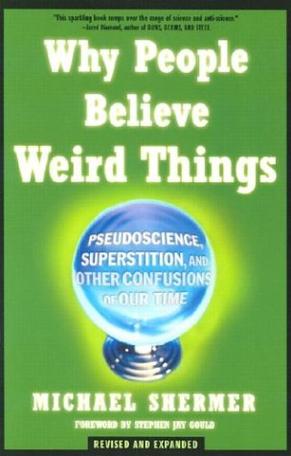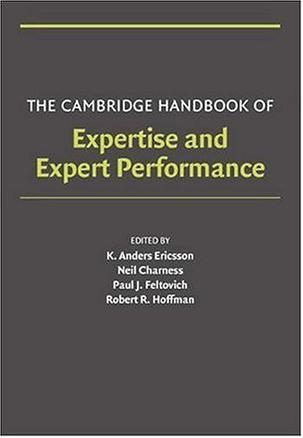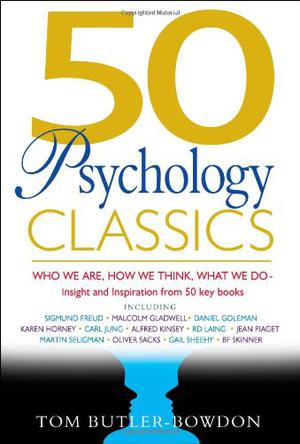-

Creativity
在线阅读本书 Creativity is about capturing those moments that make life worth living. The author's objective is to offer an understanding of what leads to these moments, be it the excitement of the artist at the easel or the scientist in the lab, so that knowledge can be used to enrich people's lives. Drawing on 100 interviews with exceptional people, from biologists and physicists to politicians and business leaders, poets and artists, as well as his 30 years of research on the subject, Csikszentmihalyi uses his famous theory to explore the creative process. He discusses such ideas as why creative individuals are often seen as selfish and arrogant, and why the tortured genius is largely a myth. Most important, he clearly explains why creativity needs to be cultivated and is necessary for the future of our country, if not the world. -

Why People Believe Weird Things
Revised and Expanded Edition. In this age of supposed scientific enlightenment, many people still believe in mind reading, past-life regression theory, New Age hokum, and alien abduction. A no-holds-barred assault on popular superstitions and prejudices, with more than 80,000 copies in print, "Why People Believe Weird Things" debunks these nonsensical claims and explores the very human reasons people find otherworldly phenomena, conspiracy theories, and cults so appealing. In an entirely new chapter, "Why "Smart" People Believe in Weird Things," Michael Shermer takes on science luminaries like physicist Frank Tippler and others, who hide their spiritual beliefs behind the trappings of science. Shermer, science historian and true crusader, also reveals the more dangerous side of such illogical thinking, including Holocaust denial, the recovered-memory movement, the satanic ritual abuse scare, and other modern crazes. "Why People Believe Strange Things" is an eye-opening resource for the most gullible among us and those who want to protect them. -

Intimate Relationships
Intimate Relationships, 3rd editon, by Sharon S. Brehm, Rowland S. Miller, Daniel Perlman, and Susan Campbell preserves the personal appeal of the subject matter and vigorous standards of scholarship that made the earlier editions so successful. Written in a unified voice, this text builds on the reader-friendly tone that was established in the first two editions. It presents the key findings on intimate relationships, the major theoretical perspectives, and some of the current controversies in the field. Brehm, Miller, Perlman, and Campbell illustrate the relevance of close relationship science to readers' everyday lives, encouraging thought and analysis. Classic contributions to the field are covered in addition to topics on the leading edge of research. -

The Cambridge Handbook of Expertise and Expert Performance
This 2006 book was the first handbook where the world's foremost 'experts on expertise' reviewed our scientific knowledge on expertise and expert performance and how experts may differ from non-experts in terms of their development, training, reasoning, knowledge, social support, and innate talent. Methods are described for the study of experts' knowledge and their performance of representative tasks from their domain of expertise. The development of expertise is also studied by retrospective interviews and the daily lives of experts are studied with diaries. In 15 major domains of expertise, the leading researchers summarize our knowledge on the structure and acquisition of expert skill and knowledge and discuss future prospects. General issues that cut across most domains are reviewed in chapters on various aspects of expertise such as general and practical intelligence, differences in brain activity, self-regulated learning, deliberate practice, aging, knowledge management, and creativity. -

Why Zebras Don't Get Ulcers, Third Edition
Now in a third edition, Robert M. Sapolsky's acclaimed and successful Why Zebras Don't Get Ulcers features new chapters on how stress affects sleep and addiction, as well as new insights into anxiety and personality disorder and the impact of spirituality on managing stress. As Sapolsky explains, most of us do not lie awake at night worrying about whether we have leprosy or malaria. Instead, the diseases we fear - and the ones that plague us now - are illnesses brought on by the slow accumulation of damage, such as heart disease and cancer. When we worry or experience stress, our body turns on the same physiological responses that an animal's does, but we do not resolve conflict in the same way - through fighting or fleeing. Over time, this activation of a stress response makes us literally sick. Combining cutting-edge research with a healthy dose of good humour and practical advice, Why Zebras Don't Get Ulcers explains how prolonged stress causes or intensifies a range of physical and mental afflictions, including depression, ulcers, colitis, heart disease, and more. It also provides essential guidance to controlling our stress responses. This new edition promises to be the most comprehensive and engaging one yet. -

50 Psychology Classics
In a journey spanning 50 books, hundreds of ideas and over a century, "50 Psychology Classics" looks at some of the most intriguing questions relating to what motivates us, what makes us feel and act in certain ways, how our brains work, and how we create a sense of self. "50 Psychology Classics" explores writings from some iconic figures such as Freud, Adler, Jung, skinner, James, Piaget and Pavolv, but also highlights the work of contemporary thinkers such as Gardner, Gilbert, Goleman and Seligman. We all need a personal theory of what makes people tick. To survive and thrive, we have to know who and what we are, and to be canny about the motivations of others. The common route to this knowledge is life experience, but we can advance our appreciation of the subject more quickly through reading. From the author of the bestselling "50 Self-Help Classics", "50 Success Classics" and "50 Spiritual Classics", which have sold over 100,000 in the English language and have been translated into 17 languages, "50 Psychology Classics" will further your understanding of human nature and yourself. You will find life-changing insights from 50 key books from the following authors: Alfred Adler; Gavin de Becker; Eric Berne; Edward de Bono; Robert Bolton; Nathaniel Branden; Isabel Briggs Myers; Louann Brizendine; David D Burns; Robert Cialdini; Mihaly Csikszentmihalyi; Albert Ellis and Robert Harper; Milton Erickson; Erik Erikson; Hans Eysenck; Susan Forward; Viktor Frankl; Anna Freud; Sigmund Freud; Howard Gardner; Daniel Gilbert; Malcolm Gladwell; Daniel Goleman; John M Gottman; Harry Harlow; Thomas A Harris; Eric Hoffer; Karen Horney; William James; Carl Jung; Eric Kandel; Alfred Kinsey; Melanie Klein; RD Laing; Abraham Maslow; Stanley Milgram; Ivan Pavlov; Fritz Perls; Jean Piaget; Steven Pinker; VS Ramachandran; Carl Rogers; Oliver Sacks; Barry Schwartz; Martin Seligman; Gail Sheehy; BF Skinner; Douglas Stone; William Styron; and, Robert E Thayer.